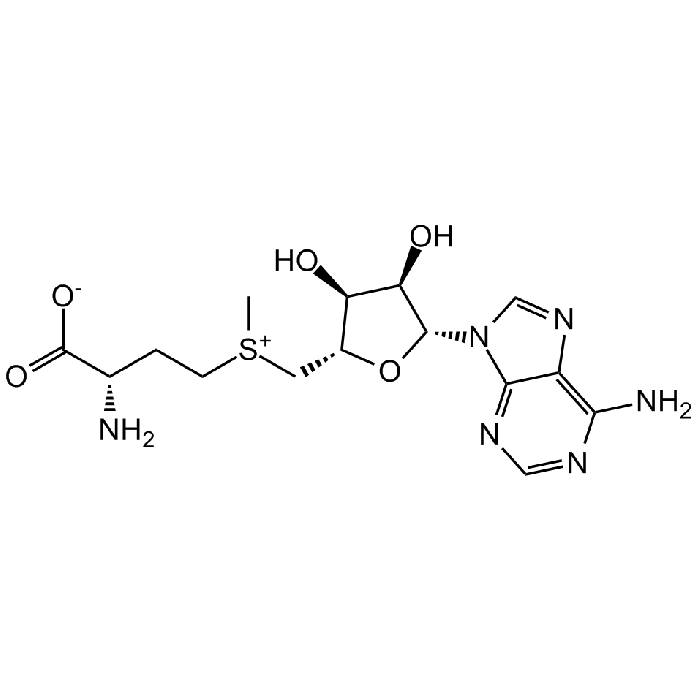Cookie Policy: This site uses cookies to improve your experience. You can find out more about our use of cookies in our Privacy Policy. By continuing to browse this site you agree to our use of cookies.
Chemodex
S-Adenosylmethionine

| Product Details | |
|---|---|
| Synonyms | SAM; SAMe; AdoMet; Ademethionine; S-Adenosyl-L-Methionine |
| Product Type | Chemical |
| Properties | |
| Formula | C15H22N6O5S |
| MW | 398.44 |
| CAS | 29908-03-0 |
| Source/Host Chemicals | Synthetic. |
| Purity Chemicals | ≥95% (NMR) |
| Appearance | White to off-white powder. |
| Solubility | Soluble in water (20mg/ml) or DMSO (20mg/ml). |
| Identity | Determined by 1H-NMR. |
| Declaration | Manufactured by Chemodex. |
| Other Product Data |
Click here for Original Manufacturer Product Datasheet |
| InChi Key | MEFKEPWMEQBLKI-AIRLBKTGSA-N |
| Smiles | C[S+](C[C@@H]1[C@@H](O)[C@@H](O)[C@H](N2C=NC3=C(N)N=CN=C32)O1)CC[C@H](N)C([O-])=O |
| Shipping and Handling | |
| Shipping | AMBIENT |
| Short Term Storage | -20°C |
| Long Term Storage | -20°C |
| Handling Advice | Protect from light and moisture. |
| Use/Stability | Stable for at least 2 years after receipt when stored at -20°C. |
| Documents | |
| Product Specification Sheet | |
| Datasheet |
 Download PDF Download PDF |
S-Adenosylmethionine (SAM) is the first product of the methionine cycle and is implicated in the synthesis of polyamines and in the transsulfuration pathway leading to homocysteine and reduced glutathione (GSH) biosynthesis. SAM is synthesized from methionine and ATP in a reaction catalyzed by methionine adenosyltransferases (MATs). These enzymes are encoded by two genes, MAT1A and MAT2A. SAM plays an essential role as methyl-donor for the methylation reactions during which it is transformed to S-adenosylhomocysteine (SAH). SAH, a strong inhibitor of transmethylations, is transformed to homocysteine (HCY) by a specific hydroxylase. The methionine cycle plays a fundamental role in the cellular metabolism and the alteration of its functionality causes important disorders linked to modification of DNA methylation and gene expression, redox imbalance and metabolic reprogramming in liver and brain. More than 40 methyl transfers from SAM are known, to various substrates such as nucleic acids, proteins, lipids and secondary metabolites. In bacteria, SAM is bound by the SAM riboswitch, which regulates genes involved in methionine or cysteine biosynthesis. In eukaryotic cells, SAM serves as a regulator of a variety of processes including DNA, tRNA, and rRNA methylation; immune response; amino acid metabolism; transsulfuration; and more. In plants, SAM is crucial to the biosynthesis of ethylene, an important plant hormone and signaling molecule. SAM is a dietary supplement with potent antidepressant effects, and has the potential for liver disease and osteoarthritis research.
[1] S.C. Lu, et al.; Physiol. Rev. 92, 1515 (2012) | [2] R.M. Pascale, et al.; Cells 11, 409 (2022)





